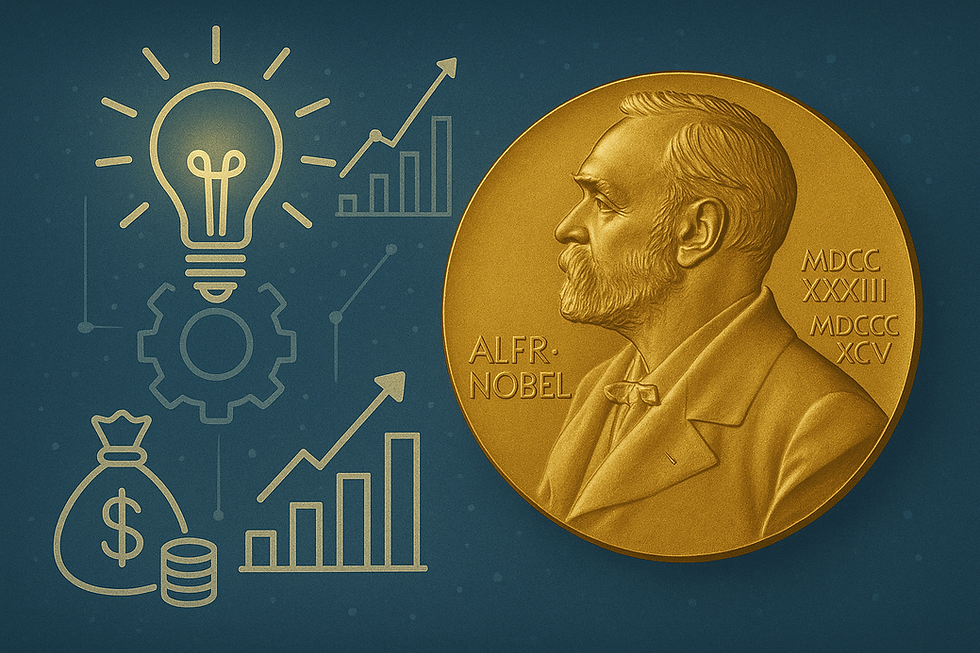Israeli Tech Plays a Key Role in Global Energy Innovation
- axisinnovation
- Jun 16, 2022
- 7 min read
Energy has become one of the most important and pressing issues of our time. How we create, manage, and distribute energy has implications for every person, company, and country around the world. Over the last decade we have seen energy companies embrace and deploy technological advancements in hardware, especially with the development of the renewable energy sector. However in more recent years, energy tech has advanced to include software innovations including AI, machine learning, cyber security, and more. Moreover, since the start of 2022, the energy sector is the only group within the S&P sector that has strong gains, showing how critical energy is in bear and bull markets.
Looking ahead to the future, energy companies are looking for new innovations to create a clean energy future for the world. As such, a wave of new energy startups have emerged to help advance energy production and efficiency. Israel, the startup nation, has emerged as a global leader in these solutions.
Israel’s Energy Tech Ecosystem
First, let’s unpack the existing energy tech sector in Israel. Using data from Startup Nation Central, we found there to be 193 Israeli companies focussing on energy tech. The country’s energy tech sector is relatively mature, with over half of the companies being founded before 2015. Whilst 2021 was a record breaking year for Israeli high tech in general, energy tech was the only sector that experienced a fall in investment last year, from $103 million in 2020 to $48 million in 2021. This is because Israeli energy tech is characterized by older, more established companies who are not seeking new funding.
However, Israel continues to produce new energy-tech startups each year, and that pace has been increasing. Since 2017, 67 new energy tech companies have been founded. According to a report by Calcalist Tech, Israel’s energy tech ecosystem has increased by 20% since 2020. This is promising news for the sector, in which we expect to see growing investment in these companies in the coming years.
At Axis Innovation we categorized our data set of 193 energy-tech startups into 13 sub-sectors. We found that nearly 30% of energy tech startups are focussed on developing technologies for renewable energy - not surprising given the climate crisis that the world is facing.
We found Israel to be home to 57 renewable energy startups. Within these 57 startups, 41 (72%) are solar energy solutions. The remaining 16 startups focus on wind, thermal, kinetic, hydro and biomass energy.
Solar energy requires solar panel infrastructure to be built on land, for example on the roofs of houses and other buildings. In order to do so however, there are many challenges that need to be overcome. This is where Israeli software innovations come into play with some exciting startup technologies.
Earlier this year, Israeli startup XFloat announced plans to test a floating solar photovoltaic (PV) system that uses AI and machine learning capabilities to track the sun. XFloat’s intelligent water management system controls water loads and pumps for accurate tilting and tracking of the sun. The company refines the data collected from sensors, and directs them to a knowledge-based machine learning process for predictive PV performance and operations and maintenance. The project is being carried out in cooperation with Mekorot, Israel’s national water company - XFloats panels will be installed in Mekerot’s reservoirs. Another benefit of floating solar panels is that they reduce evaporation from bodies of water that are prone to drought, and they are more efficient than normal solar panels due to the water’s cooling effect.
Israel’s Energy Tech Ecosystem
The growth of Israel’s startup industry has attracted the attention of some of the world’s largest energy companies. There are over a dozen global energy corporations aactive here in R&D or scouting, including LG, Schneider, GE, Chevron, Siemens, Enel, BP, Centrica, Innogy, and others. A great example of open innovation is the Enel Innovation Lab. Opened in 2016, the Enel Hub Israel connect promising startups, tech companies and potential partners with Enel and its business lines. In 2020, Enel expanded their activities in Israel and partnered with Mastercard to create the Finsec Innovation Lab, with the goal to advance innovations in Israel in financial technology and cybersecurity for the payments and energy ecosystem globally.
Technology In Energy Tech
Until recently, most of the global energy tech industry’s efforts to transition towards a cleaner future have been hardware focussed. Carbon-intensive systems have been replaced by low-carbon/ zero carbon infrastructure. However, now the global energy tech industry is increasingly looking to startups to develop both hardware and innovative software solutions in the fields of AI, machine learning and big data that can be integrated into existing systems.
We’ve identified 3 disruptive startups in different energy sectors:
Addionics is a deep-tech start-up that focuses on improving the energy density and efficiency of batteries using both hardware and software. The company integrates their unique in-house optimization and artificial intelligence software into a battery’s hardware, thus creating a smart and complete solution. Addionics software uses artificial intelligence and structure optimization algorithms that are able to predict and determine the best structure according to the application requirements. The company’s technology can be applied across 6 different sectors, including electric vehicles, smartphones and laptops, consumer electronics, IOTs and wearables, aviation and drones and medical devices. By focusing on the physics of the battery instead of the materials used, and through their AI technology, Addionics claims to be able to increase the accessible capacity of the battery by 200%, decrease the charging time by 50%, and improve their thermal and mechanical stability, thus making the batteries safer.
Brightmerge has developed a SaaS-based economic optimisation platform that utilizes an AI engine to verify the financial, sustainability, and reliability of micro-grid systems. Their solution is aimed at energy planning and operations departments. Through Brightmerge’s platform, companies input data for their microgrid project, including location, layout and electric consumption. Brightmerge automatically analyzes this data against relevant crowd-sourced data, as well as weather, cost of energy, construction costs and any other relevant factors for constructing a microgrid system. Brightmerge’s AI simulator and proprietary pricing algorithm determines potential cost reductions that can be gained when the system is installed and operating.
Hydrogen and decarbonisation solutions have attracted a lot of interest from investors, who see these as driving factors for the transition to the circular economy. Earlier this year, hydrogen production startup, H2Pro, raised $75 million in a B round from a team of 5 investors including Bill Gates’ climate tech investing fund Breakthrough Energy Ventures and global leading steel and mining company ArcelorMittal. H2Pro’s core technology, based on research done by founding team at Technion, is Electrochemical – Thermally Activated Chemical (E-TAC) water-splitting technology, which uses electricity to split water into hydrogen and oxygen. By 2023, the company promises to deliver green hydrogen at under $2 per kilogram, and under $1 per kilogram later this decade.
Israeli Energy Tech Exits
Last year saw a number of impressive exits, including Driivz, an electric vehicle start-up who were acquired by Gilbarco Veeder-Root for roughly $220 million. Driivz had developed an operating system for the purpose of managing charging networks of electric vehicles. Gilbarco Veeder-Root is a supplier of equipment and technology for refueling and charging electric vehicles in convenience stores as well as for commercial fleets.
Metrycom, a supplier of smart-grid sensors and analytics to electricity suppliers was acquired by Megger, an electrical measurement company. Megger CEO, Jim Fairbairn explained what made Metrycom so interesting to them, , stating that “Metrycom’s Smart Grid sensor technology is best-in-class, enabling power utilities better visibility into MV networks to assist in grid operation management and preventative condition-based maintenance, all of which improve grid reliability”.
Predictions
Based on our research and analysis of the ecosystem, we have made some predictions for the future of energy tech in Israel.
Whilst Israel’s energy tech ecosystem is mature, it continues to produce new startups each year - some sub-sectors more than others. Over the last decade, battery tech has exploded in Israel with two thirds of battery tech startups founded after 2017. Startups in this field are developing new generation lithium-ion batteries, new energy storage solutions for batteries, as well as AI optimization software that can be integrated into battery hardware to better its performance. We expect battery tech in Israel to continue to boom throughout 2022 and beyond.
Following last year’s decrease in investment in Israeli energy tech, we expect funding to bounce back. There has been a recent spike in cleantech investment globally, last year rising by 27% from the previous year. At last year’s United Nations Climate Change Conference (COP26), a great emphasis was placed on addressing emissions in the agricultural sector and decarbonising mass farming processes. We expect greater investment in Israel’s agtech sector and across any other software solutions aimed at energy usage decarbonisation.
One use case for artificial intelligence within the energy tech industry that we expect to grow is predictive maintenance of renewable energy sources. Renewable energy sources need to be constantly monitored in order to optimize their performance. For example, solar panels become less efficient at generating energy when their surface is dirty. Israeli startup Raycatch has developed an AI surveillance system for solar panel plants. DeepSolar applies proprietary AI and machine learning algorithms to existing solar panel plant data and provides plant owners with insights on solar panel health and the exact location of any panel issues. According to Startup Nation Central Israel is home to 13 startups who have developed solutions for predicting when a renewable energy source needs to be repaired or checked, and we expect this number to increase in the near future.
Summary
The transition to clean energy and a zero-carbon economy is at the forefront of all energy corporations' future plans. The global industry relies on startups for innovative energy saving, energy storage and decarbonisation technologies, as well as AI software-based solutions for grid analytics and management, power consumption forecasting and predictive maintenance for renewable energy sources. Many corporations are looking to Israel for these technologies. At Axis Innovation, energy tech is one of the main industries that we focus on. If you are interested in working with Israeli energy tech startups then email us info@axisinnovation.com.
References
https://www.calcalistech.com/ctech/articles/0,7340,L-3929429,00.html
https://nocamels.com/2022/05/xfloat-mekorot-solar-panels-energy-floating/
https://www.cnbc.com/2022/01/25/h2pro-founded-by-ex-juno-viber-founder-raises-from-gates-fund.html
https://www.geektime.com/israeli-start-up-driivz-was-sold-for-more-than-200m-to-an-american-company/
https://www.crunchbase.com/organization/gilbarco-veeder-root
https://www.statista.com/statistics/502210/worldwide-investment-in-sustainable-energy-annual-growth/
https://investingnews.com/daily/tech-investing/cleantech-investing/cleantech-outlook/
https://www.startus-insights.com/innovators-guide/top-10-renewable-energy-trends-2022/


